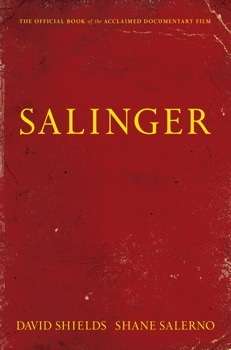Salinger

Editorial Simon x{0026} Schuster Ltd
Fecha de edición septiembre 2013 · Edición nº 1
Idioma inglés
EAN 9781476744834
698 páginas
Libro
encuadernado en tapa dura
Resumen del libro
Raised in Park Avenue privilege, J. D. Salinger sought out combat, surviving five bloody battles of World War II, and out of that crucible he created a novel, "The Catcher in the Rye," which journeyed deep into his own despair and redefined postwar America.
For more than fifty years, Salinger has been one of the most elusive figures in American history. All of the attempts to uncover the truth about why he disappeared have been undermined by a lack of access and the recycling of inaccurate information. In the course of a nine-year investigation, and especially in the three years since Salinger's death, David Shields and Shane Salerno have interviewed more than 200 people on five continents (many of whom had previously refused to go on the record) to solve the mystery of what happened to Salinger.
Constructed like a thriller, this oral biography takes you into Salinger's private world for the first time, through the voices of those closest to him: his World War II brothers-in-arms, his family, his friends, his lovers, his classmates, his editors, his "New Yorker" colleagues, his spiritual advisors, and people with whom he had relationships that were secret even to his own family. Their intimate recollections are supported by more than 175 photos (many never seen before), diaries, legal records, and private documents that are woven throughout; in addition, appearing here for the first time, are Salinger's "lost letters"--ranging from the 1940s to 2008, revealing his intimate views on love, literature, fame, religion, war, and death, and providing a raw and revelatory self-portrait.
Salinger published his last story in 1965 but kept writing continuously until his death, locked for years inside a bunker in the woods, compiling manuscripts and filing them in a secret vault. Was he a genius who left the material world to focus on creating immaculate art or a haunted recluse, lost in his private obsessions? Why did this writer, celebrated by the world, stop publishing? Shields and Salerno's investigation into Salinger's epic life transports you from the bloody beaches of Normandy, where Salinger landed under fire, carrying the first six chapters of "The Catcher in the Rye" . . . to the hottest nightclub in the world, the Stork Club, where he romanced the beautiful sixteen-year-old Oona O'Neill until she met Charlie Chaplin . . . from his top-secret counterintelligence duties, which took him to a subcamp of Dachau . . . to a love affair with a likely Gestapo agent whom he married and brought home to his Jewish parents' Park Avenue apartment and photographs of whom appear here for the first time . . . from the pages of the "New Yorker," where he found his voice by transforming the wounds of war into the bow of art . . . to the woods of New Hampshire, where the Vedanta religion took over his life and forced his flesh-and-blood family to compete with his imaginary Glass family.
Deepening our understanding of a major literary and cultural figure, and filled with many fascinating revelations-- including the birth defect that was the real reason Salinger was initially turned down for military service; the previously unknown romantic interest who was fourteen when Salinger met her and, he said, inspired the title character of "For Esme--with Love and Squalor"; the first photographs ever seen of Salinger at war and the last known photos of him alive; never-before-published love letters that Salinger, at fifty-three, wrote to an eighteen-year-old Joyce Maynard; and, finally, what millions have been waiting decades for: the contents of his legendary vault--"Salinger" is a monumental book about the cost of war and the cost of art.
Biografía del autor
(Barcelona, 1973) es, desde sus inicios, un narrador curtido en las más oscuras trincheras literarias (su pasión por H.P. Lovecraft y toda la narrativa gótica del XIX, la superstición, el victorianismo, el momento en el que Viejo y el Nuevo Mundo se confundían, se superponían, buscaban aliados aquí y allá, queda más que patente en cada uno de sus escritos), pero también, un narrador universal, por lo que tienen de singulares sus historias, que consiguen extraer de la realidad una parte para analizarla en un mundo paralelo, tan parecido al real que resulta incluso más real que el que pisamos. Curtido y respetado traductor (lo ha sido de Ted Hughes, Ezra Pound, David Foster Wallace, Chuck Palahniuk, J.M. Coetzee, Donald Ray Pollock y un largo e impresionante etcétera) y guionista ocasional (suyo es el guión de Remake, de Roger Gual), Calvo debutó como narrador en 2001, con la recopilación de lisérgicos relatos Risas enlatadas, a la que siguió su primera novela, El dios reflectante (2003). En 2005 volvió a los cuentos, con la brillante Los ríos perdidos de Londres, y dos años después publicó la novela que lo llevaría a organizar lecturas en librerías norteamericanas: Mundo Maravilloso. Traducida al inglés, el francés, el alemán y el italiano, y publicada, con un enorme éxito de crítica, en otros tantos países, la novela fue finalista del premio Fundación José Manuel Lara en 2008, y relanzó al autor, que sus contemporáneos habían vinculado sin su consentimiento a la llamada Generación Nocilla, situándolo en un nuevo escenario, el de la mejor y más personal narrativa española de los últimos años. En esa línea apuntaba su anterior trabajo, Corona de flores, novela en la que el espíritu zapping de sus primeras obras dio paso a un entramado dickensiano narrado con un envidiable (y siempre muy propio) pulso narrativo. Pulso con el que también está construido El jardín colgante, novela en la que Calvo alcanza una nueva cima en su narrativa, propia de un narrador en mayúsculas.








